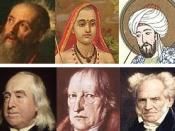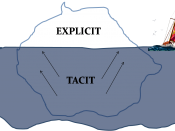What does man know? For years beyond count the scholarly elite and plebeians alike have toiled over the issues berthed in human minds as a result of the theory of knowledge. What is knowledge? Is it relative or is it objective? Can a belief be justified as a truth? Can people truly know anything at all? The diversity among the philosophical viewpoints of history's most prominent academians does nothing, but add to the obscurity of the subject matter, making a firm grasp around a solid answer to the questions presented seem unattainable. Figures, like Rene Descartes, will argue, under the position of the rationalist, that knowledge is possible with the use of reason (Felder 126). Other philosophers, such as George Berkeley and John Locke, who both hold empiricist views, will also argue that knowledge can be gained. Their positions will hold that an application of logical reasoning combined with observation from the normal senses is the way to acquire knowledge (Felder 119).
When attempting to tackle such a daunting subject intellectual perception must be conditioned to see and understand that there is no black and white; that a vast mass of gray areas exist and must be accounted for to validate any argument. Since efforts to prove or disprove that human beings can have truths are oriented on the basis of assumptions about the valid practices of creating knowledge (Hall 330) it can be sagaciously postulated that an acquisition of knowledge is, indeed, possible. Moreover, there is knowledge that is objective as well as knowledge that is relative.
When building an argument it is important to first erect a foundation. So, in order to build a foundation fitting the proposed argument it is necessary to get some sort of clutch on what knowledge is. To David Hume, "the...


